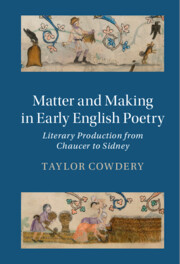
- Cited by 1
-
Cited byCrossref Citations
This Book has been cited by the following publications. This list is generated based on data provided by Crossref.
2023. The Life Course in Old English Poetry. p. 268.
- Publisher:
- Cambridge University Press
- Online publication date:
- June 2023
- Print publication year:
- 2023
- Online ISBN:
- 9781009223768
- Subjects:
- Literature, Anglo Saxon and Medieval Literature
- Series:
- Cambridge Studies in Medieval Literature (121)


